Keller is installing more than 400 continuous flight auger (CFA) piles to depths of up to 200 ft, the deepest full-length reinforced piles Keller has installed. This incredible achievement allows Keller clients to build increasingly taller, slimmer buildings more cost-effectively.

St. Regis will be the city’s tallest project to date: two gleaming towers more than 60 stories high, featuring almost 400 multimillion-dollar residences on the pristine beachfront.
It’s a place Keller knows incredibly well, having been involved in virtually every building development in the area.
Being right near the sea, the area is known for having soft limestone layers that are challenging for settlement. This super-high-end tall project will also have the deepest cantilever coastal basement excavation—up to 45 ft. Significant engineering efforts were necessary due to the incredible soil and water pressures at that depth.
Going deeper to help buildings reach higher
Keller has a long track record with the client (Coastal Construction) and developers (Fortune International Group and Château Group). Keller’s involvement through a design-assist build at an early stage has been key to ensuring successful delivery.
So why the need for such deep piles? With a growing market, challenging soils, and expensive land costs, buildings need to be taller and more slender, requiring deeper and deeper foundations. Up to the challenge, Keller has developed new equipment and continued to install deeper piles over the years.
Deeper piles have a significant cost benefit, perhaps saving 30-40% in cost and four to five months of schedule compared to other solutions.

Focus on safety and quality
Installing such massive piles comes with specific challenges. Unlike some techniques, the piles aren’t sectional, which means continuous drilling. Once the bottom is reached, grout is pumped back up to the top. It takes tremendous effort, quality controls and mix designs to ensure the grout is consistent and doesn’t segregate.
The fully reinforced piles require 200-ft steel cages and some big equipment. The team is using incredibly large cranes—1.2 million pounds in weight. Working near the beach, with significant wind loads and gusts, the team is very careful in terms of safety, working platform stability, and logistics.
Requiring more than piles, one of the biggest project challenges is the massive 108,000 ft2 double-level, double-height basement that must be safe and watertight for the pile cap and basement wall construction. For this, the Keller team has used bottom soil mixing with reinforced cantilever deep walls (up to 45 ft excavation). This removed the need for bracing or rakers that would have penetrated the waterproofing. The walls themselves are supported by very large diameter tubular soil mixing walls. Tiebacks were also used in some temporary areas to enable the walls to support the weight of the construction logistics.
A trusted partner
The soil mixing and walls are complete, and work on the piles – ranging from 90 ft in depth to 200 ft – started in August. Once the piles are complete, Keller will begin the excavation, hauling, disposal, pile cutting and dewatering.
As with any Keller project, quality control and safety are paramount. This site is extremely active, with a crew of over 50, three soil mix rigs, two cranes, loaders, excavators, trucks, and constant deliveries. The team is doing all of this while working inches away from expensive neighboring buildings in a very affluent area.